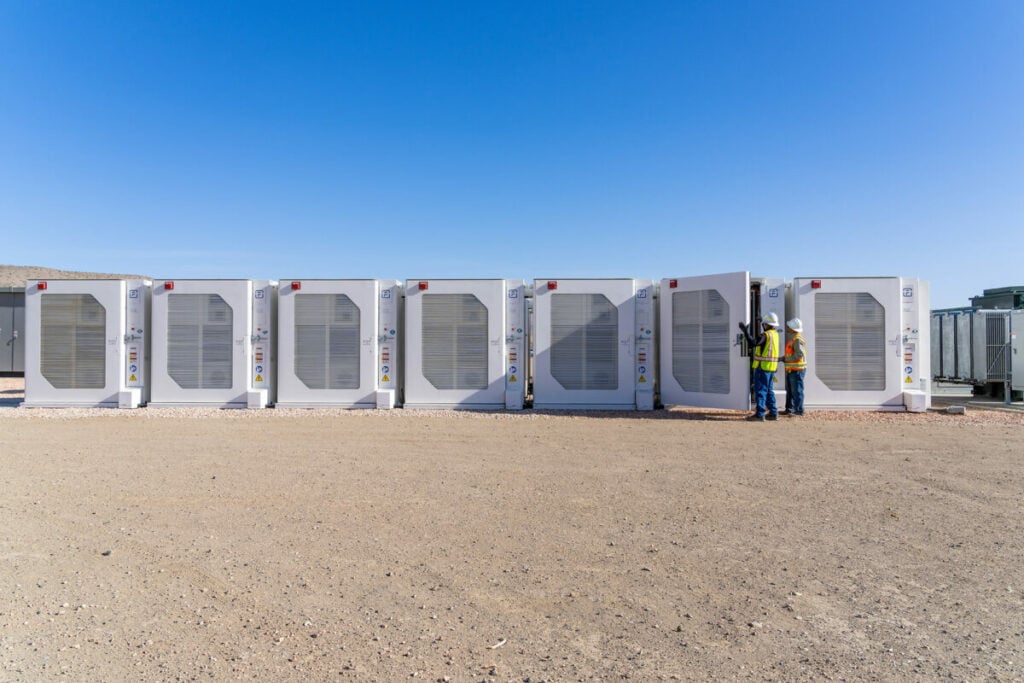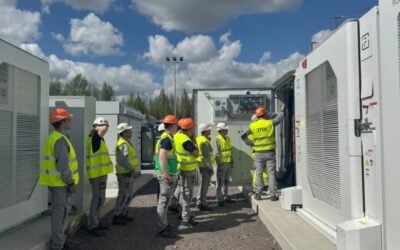
Executives from battery energy storage system (BESS) integrator Fluence discussed the company’s recent third quarter results in an earnings call with analysts.
As Energy-Storage.new reported last week, the firm saw a year-on-year fall in revenue in the three months to 30 June (its Q3) although the long-term outlook looks good with profits and order intake shooting upwards.
Enjoy 12 months of exclusive analysis
- Regular insight and analysis of the industry’s biggest developments
- In-depth interviews with the industry’s leading figures
- Annual digital subscription to the PV Tech Power journal
- Discounts on Solar Media’s portfolio of events, in-person and virtual
Postponed projects explain fall, ‘lumpiness’ to continue and international business more profitable than US
CFO Ahmed Pasha explained that the company’s results will continue to be ‘lumpy’ over the four quarters of the year as it works on a relatively lower number of very high-value projects, so project timing has a large effect. Put simply, revenues could differ greatly from quarter to quarter for the foreseeable.
Pasha went on to explain that the fall in Q3 was primarily down to the postponement by a customer of two projects that would have been worth US$100 million, and the signing of certain projects in its backlog were delayed. The reasons for the delay were nothing to do with interconnection issues, however, and more around “site readiness, civil works, permitting and the customer decision process”, Pasha said.
Interestingly, CEO Julian Nebreda confirmed an analyst’s suggestion that the firm’s international activities have a higher average selling price (ASP) and higher margins than the US business, and the higher weighting to international activities in the quarter explained the higher profits. “We have seen a lot of profit in the international markets,” Nebreda said.
The reasons include the fact that the firm’s offering internationally tends to incorporate engineering, procurement and construction (EPC) services as part of a more broader offering. The firm has also been actively selling its storage-as-transmission product, the Ultrastack, in the European market which has a higher ASP.
US cells
Fluence has also revealed that it has secured US-manufactured cells from AESC (Automotive Energy Supply Corporation), a joint venture between Nissan and Tokin Corporation which is building gigafactories in the US. Those cells will enable it to provide BESS that meet the criteria for domestic content tax credit incentives under the Inflation Reduction Act.
Several analysts quizzed Pasha and Nebreda about this. Nebreda said the cell costs were “very competitive” “and that “everybody realises this is the right move, and we’re ahead of everybody”.
In response to an analyst question around whether US cells could cover all its US demand, he also revealed that Fluence has contracted with AESC for two production lines and has the right of first refusal for any additional lines it brings up.
“So we have ample capacity to meet the demand that we see today and our clearly to meet our commitments,” Nebreda said, although not going as far as saying that would be true in future.
Later, he said: “It’s going to be a tight market, but I think that there will be enough to cover demand, though I don’t know about [if it will be as early as] 2026. But over time, we’ll have enough to cover the demand in the U.S. This is very important and it will happen. We will work to meet that demand.”
40% of US demand relates to data centres
Nebreda also said that 40% of its US projects were ‘indirectly’ related to data centres. By this, he meant that 40% of projects were being deployed to support renewable energy power purchase agreements (PPAs) being procured by big tech players to supply their growing data centre demand with clean energy.
SEC investigation and independent law firm enlisted
In February this year, short selling investment firm Blue Orca issued a short note on Fluence alleging numerous financial improprieties and major shareholder AES, and a US affiliate of its other major shareholder Siemens, were both unhappy with the company’s performance – something Fluence immediately denied.
In a 10-Q form filed along with Fluence’s results last week, the company said that, in response to that report, it completed an internal investigation with the help of outside counsel and forensic accountants.
“They looked at every comment and found they had zero merit,” Nebreda said in the call.
The Securities and Exchange Commission (SEC) is however conducting a formal investigation into the company, the 10-Q added.
“Although we cannot predict the timing or the outcome based on the nature of these matters and information requested by the SEC we do not expect it to have a material impact on our financial condition,” Pasha said in the call.
While the markets reacted negatively to the Blue Orca note at the time of its publication, they have reacted positively to the earnings release and discussion last week, trading around 10% higher than before it.






